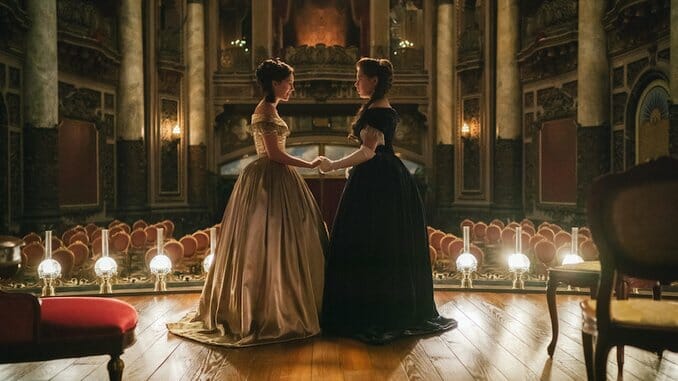Ella Hunt on the Dickinson Season 2 Finale, and What’s Next for Emisue
Photo Courtesy of Apple TV+
Yearning wafts through every crevice of the second season of Dickinson—and honestly, most of the first season too. There’s that ever-present longing for love that Emily (Hailee Steinfeld) inks in her poems, but there’s also a longing for acceptance in society, for an understanding of emotions, and for fame. Nobody, a new character personified by Will Pullman, stalks Emily around every corner, warning her of a fretfully anonymous fate. If Emily wants to be known, she’ll have to make a name for herself before Death (Wiz Khalifa) arrives. Enter Sam Bowles (Finn Jones), editor-in-chief of The Springfield Republican, who promises to publish Emily’s poems. Finally, her yearning seems to be satisfied.
Or, perhaps, another option for her to consider: Sue Gilbert (Ella Hunt), Emily’s best friend, confidant, once-lover, and new sister-in-law. If she’s not acclaimed by the world, at least Emily will be known by the one she loves most. But this season barricades Emily and Sue from considering their complex feelings for one another, forcing them to grapple with that all-familiar chasm between the mortifying ideal of being known versus the rewards of being loved. Then, there’s the equally difficult fact that they’re queer women in the 19th century—and Sue’s already struggling to come to terms with her role as a housewife to Emily’s brother, Austin (Adrian Blake Enscoe).
The final two episodes of Dickinson’s second season embody all of these concerns, finally bringing this relationship to the forefront of Alena Smith’s jubilously anachronistic, though always honest series. Paste got to chat with Ella Hunt about Season 2 of Dickinson, including Emisue, that rhapsodic cake scene, and more.
This interview has been edited for length and clarity.
![]()
Paste: The one thing that really grabbed my attention was in the finale, that one euphoric scene with you and Emily at the end—the one with the cake and the desserts.
Ella Hunt: Oh, yeah! That was a lot of fun to shoot. Also, it’s a season of such pain and yearning, with so much brewing under the surface for Emily and Sue. For Hailee and I to have a scene together where we truly just get to let go of that pain and enjoy each other’s company and relish, for a moment, in these two characters being blissfully happy in each other’s company without a care in the world, was so much fun to get to shoot. It was a great day. I ate so much cake! I don’t know whether it ended up in the scene, but she shoves a piece of cake into my mouth. I’m a cake lover by trade, in fact. But even for me, it was a lot of cake.
Paste: I was going to say, I’m not sure if that would be a dream to shoot that over and over again or if it would be tricky.
Hunt: It was definitely fun. And hilarious. I also did nearly set myself on fire when I was crawling across the table in my corset. There were all of these candles lit, and I’m so clumsy. There were a few takes where we had to call cut and somebody would come in and move the candles away from me, because I was approaching my doom.
Paste: Also, what kind of cake was it?
Hunt: I’m trying to remember. I think it was a pretty classic Victoria sponge. I’m pretty sure that it was that or a chocolate cake. Which, both are cakes that I’m so down for eating copious amounts of. I’m obsessed with cake. At one point, I want to say my Instagram or Twitter bio was, “Actress. Musician. Cake-lover.” And it’s still true.
-

-

-

-

-

-

-

-

-

-

-

-

-

-

-

-

-

-

-

-

-

-

-

-

-

-

-

-

-

-

-

-

-

-

-

-

-

-

-

-








































